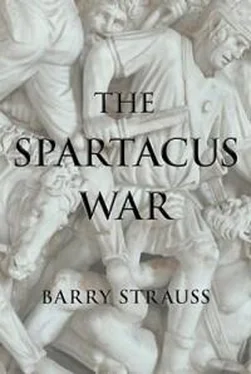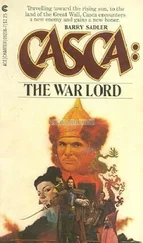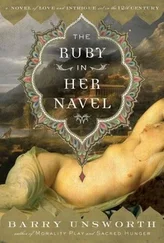When Spartacus was brought to Rome to be sold into slavery, a remarkable event is supposed to have taken place. Plutarch records the story but he does not vouch for its veracity. While the Thracian was sleeping, a snake wrapped itself around his face. Or so the tale goes, even though modern experts [27] personal communications, Professor Harry Greene, Cornell University, and Professor Luca Luiselli, University of Rome.
explain that this is impossible. Italy is home to a quite a few snake species but, according to scientists, none of them would wrap itself around a sleeping person’s face. Perhaps Spartacus woke up with a snake crawling close to or even on his face: unlikely but not impossible. The story could then have grown in the telling, either by Spartacus or others. Or maybe Spartacus said merely that he had dreamed the whole thing.
In any case, the Thracian woman interpreted the event as a miracle. Just as a snake had wrapped itself around Spartacus’s face, so would he be surrounded by ‘a great and fearful power’. The result would be - well, the manuscripts differ, with some saying Spartacus would have ‘a lucky end’ [29] Plutarch, Crassus 8.4, mss. a, b, c.
and others saying ‘an unlucky end’ [30] Plutarch, Crassus 8.4, mss. d, e, f.
. The first version is attractive, considering the positive connotations of snakes in Thrace, not to mention the worthlessness of propaganda that predicted ruin.
The Thracian woman’s words carried the weight of prophecy. Thrace had a long tradition of prophetesses and oracles, and Thracians set great store by women’s religious authority. So did the ancient Germans, who believed that there was ‘something sacred and prophetic’ [31] Tacitus, Germania 8.
about women. But anyone can grasp the timeless stereotype of the woman who speaks for natural forces: the siren, the sibyl or the witch. Spartacus’s companion might have been ‘a woman to make your heart tremble’ [32] Phyllis Mack, Visionary Women: Ecstatic Prophecy in Seventeenth-Century England (Berkeley: University of California Press, 1992), 17.
as one seventeenth-century Englishman said of a woman who prophesied in public.
Seers played a proven role as troublemakers among slaves. They had incited one revolt in Sicily in 135 BC and led another in 104 BC. The Roman agricultural expert Columella [33] On Agriculture 1.8.6.
, writing around AD 60, might have had such events in mind when he warned managers to keep prophets and witches off the estate.
We don’t know when the Thracian woman made her prophecy. Perhaps it only came later, when the revolt of the gladiators was under way. But if she predicted the future while Spartacus was still in Capua or even before, in Rome, then it might have been the spark that lit the rebellion. In the first century BC both rebels and Romans took seers very seriously.
For example, those bitter Roman political rivals, Marius and Sulla, shared a common devotion to seers. Marius brandished favourable predictions from various clairvoyants, and the most colourful of them was a Syrian prophetess named Martha [34] Plutarch, Life of Marius 17.1-3.
. Supposedly, the woman first came to the attention of Marius’s wife when Martha correctly predicted the outcome of a gladiatorial match. Marius took Martha with his army on campaign.
Sulla did not let his rival outdo him. The most powerful man in Rome before his death in 79 BC, Sulla often reported his dreams as omens and he proudly advertised the words of a seer from Mesopotamia (today, Iraq) that Sulla was destined to be the greatest man in the world. Sulla claimed the title of Felix, ‘lucky’, because of the various gods who supported him.
But unlike Spartacus, neither Sulla nor Marius would have claimed Dionysus. In addition to being the god of wine and theatre, Dionysus had a long political pedigree, going back to Olympias, the mother of Alexander the Great. More recently, Dionysus had been the symbol of Greek kings (especially Cleopatra’s dynasty, the Ptolemies of Egypt), Thracian tribes, the poor and enslaved masses of southern Italy, and various rebels against Rome, from the leaders of the Sicilian slave revolts to mutinous southern Italian elites to Mithridates. A flexible figure, Dionysus stood for power, prosperity, patriotism, liberty and even rebirth, depending on who wielded the symbol.
By associating Spartacus with a snake and god-given power, the Thracian lady gave him a new identity. She blended old notes of religion, nationalism and class into a new song of rebellion. The snake made Spartacus a Thracian hero [35] Demosthenes 18.259-60; Alexander Fol and Ivan Mazarov, Thrace and the Thracians (New York: St Martin’s Press, 1997), 28-9.
and linked him to Dionysus, who was known in his homeland as Zagreus or Sabazius.
Thracian culture glorified the image of a great heroic ancestor; Thracian art usually depicted the hero on horseback, often with a snake nearby. In Thrace, Dionysus worship was a fighting faith. For example, around 15 BC a Thracian revolt against Rome broke out; its leader, named Vologaesus, was a priest of Dionysus.
To the downtrodden, Dionysus offered hope; to the Roman ruling class, he spelled trouble. They associated him with southern Italy and Sicily, where the god was especially popular, and where rebels had fought under the banner of Dionysus over the years. In southern Italy, Dionysus was linked to Orpheus, another mythological figure from Thrace. So-called Orphic writings were widespread, and they told a tale of the death and resurrection of Dionysus, a symbol of hope for the afterlife. As a Thracian and as Dionysus’s chosen, Spartacus might find ready supporters in southern Italy: another reason for Dionysus to have worried the Senate. Even the most peaceful and law-abiding worshippers of Dionysus bothered Rome’s strait-laced elite.
Worshippers of Dionysus met in small groups where they held their ceremonies and initiated newcomers. The Greeks called these rituals ‘orgies’, the Romans called them bacchanals; the reality was exuberant but no sexual free-for-all. Worshippers drank, danced, sang and shouted out promises of liberation, rebirth and immortality. Believers demonstrated their trust in the god by showing off their snake handling, by fastening their animal skins with snakes, by wreathing their heads with them or by letting them flicker their tongue over their faces without ever biting them.
In 186 BC the Roman Senate claimed that Italy’s widespread Dionysiac groups masked a conspiracy. In an atmosphere of fear and panic, the Senate launched a witch-hunt up and down the peninsula and drove Romans out of the cult. After 186 BC, only women, foreigners and slaves were permitted to worship the god.
Dionysus was left to the powerless of Italy and they embraced him. In 185-184 BC the slave shepherds of Apulia - the heel of the Italian ‘boot’ - revolted and the sources hint that they claimed Dionysus as their patron. Between 135 and 101 BC, two slave revolts in Sicily [36] Diodorus Siculus 34.2.46, 36.4.4, with Jean Christian Dumont, Servus. Rome et l’Esclavage sous la République, Collection de l’École Française de Rome 103 (Rome: Ecole Française de Rome, Palais Farnèse, 1987), 263-4.
and one slave revolt in western Anatolia all invoked Dionysus. The god appeared again in the rebellion of Rome’s Italian allies known as the Social War (91-88 BC): rebel coins showed Bacchus, the Roman name for Dionysus, as a symbol of liberation. As mentioned earlier, Dionysus was a symbol adopted by Mithridates. The rebel king called himself the ‘new Dionysus’ [37] E. Candiloro, ‘Politica e cultura in Atene da Pidna alia guerra mitridatica’, Studi classici et orientali 14 (1965): 153-4 and n.71.
, like the Ptolemaic king Ptolemy IV (ruled 221-205 BC), and he minted coins showing Dionysus and his grapes on one side and the cap worn by a freed slave on the other.
Читать дальше












